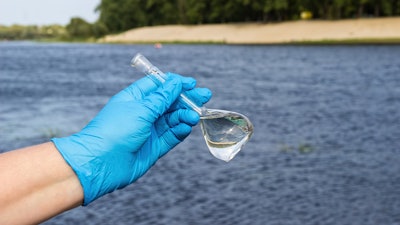
LA CROSSE, Wis. (AP) — Radioactive water that spilled into the Mississippi River last year during the $85 million decommissioning of a former nuclear power plant in Wisconsin wasn't a public health risk, according to the federal Nuclear Regulatory Commission.
LaCrosseSolutions spilled about 400 gallons (1,514 liters) of radioactive water while decommissioning the former Dairyland Power nuclear plant, the La Crosse Tribune reported.
The commission's annual inspection of decommissioning operations last month found that the February 2017 spill was one of three low-level violations at the La Crosse Boiling Water Reactor. The commission didn't issue any citations.
A hose attached to a sump pump siphoned contaminated water out of a tank, with some spilling into a storm sewer that drains into the nearby river, the inspection report said.
An analysis found small concentrations of cesium-137 in water samples that exceeded the federal limits for runoff. The amount found equals a potential dose of 0.005 to 0.01 millirem for a person who drank the contaminated water for a year. Millirem is a unit of measurement for indicating radiation dosages.
The potential exposure to ionizing radiation was very low and levels would need to be about 1 million times higher to have noticeable negative health effects, said Jeff Bryan, a nuclear chemistry professor at the University of Wisconsin-La Crosse.
"This was a really dumb accident," Bryan said. "Stupid, but not hazardous."
The company took corrective measures to make sure such an accident doesn't occur again, said Viktoria Mitlyng, a commission spokeswoman.
Mark Walker, vice president of marketing and communications of EnergySolutions, LaCrosseSolutions's parent company, declined to comment.
LaCrosseSolutions got involved in the decommissioning process in 2016. The company will remove everything down to 3 feet below the ground and return the site to Dairyland Power Cooperative. The physical demolition is expected to be done by the end of the year.






















